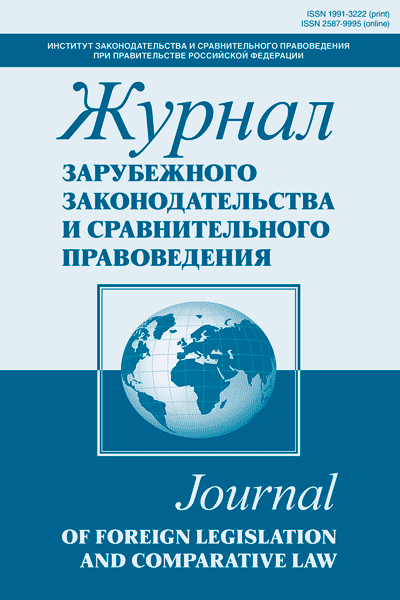The author analyzes the issues of appearance and consolidation of the idea of federalism in the Constitution of the various states and examines the characteristics of federalism. The Confederate state model has failed in the United States, as could not find a political formula that could justify the possibility of execution by the central government of its functions with the greatest efficiency. The adoption of a new formula for the exercise of political power in the USA by choosing representatives as well as the gradual accession of Member States allowed the US to overcome the disadvantages of the confederate model, which made it impossible to peaceful coexistence and effective state. The term “federal state” first appeared in German literature as most accurately reflects the context and the difference with the concept of “confederation”. As a new form of organization of the state a federal state was seen in the United States, and later in Sweden, Germany and Brazil. Despite the fact that the Americans are the creators of the phenomenon of federalism, the Constitution of the United States of 1787 does not contain any mention of the federation, federalism, or federal states. In any case, nothing takes away from the merits of Americans in the “invention of the formula” of federalism, which has undergone some changes depending on the location and the conditions which apply. The government, which wants to be called a federal, must have a constitution, two spheres of political power, the incoming participants must have a certain autonomy, as well as the opportunity to participate in the decisions of the central government also requires the Constitutional Court to deal with emerging conflicts. The federal system has made a great contribution to the history of mankind: the decision of the state of conflict with the help of legal organization, for which all parties recognize the right of the last word in matters of distribution of powers between the States.
Federalism, federation, confederation, an international treaty, the constitution, the public power, the United States, the US Constitution of 1787, the democratic regime, the separation of powers.
1. Anderson D. Politicheskaya relevantnost´ federalizma v XXI veke. Ispaniya i modeli federalizma, Madrid, 2010. № 204.
2. Araukho L. A. D. Obshchie kharakteristiki federalizma; Bastos S. (koordinator). O novoy federatsii. San-Paulu, 1995.
3. Arnold R. Fundamental´nye kontseptsii nemetskogo federalizma. Primer dlya ispanskoy reformy?. V Ispanii i avtonomii. Razmyshleniya 25 let spustya. Barselona, 2005.
4. Badia Kh. F. Unitarnoe gosudarstvo, federativnoe gosudarstvo i regional´noe gosudarstvo. Madrid, 1978.
5. Vergottini D. de. Sravnitel´noe konstitutsionnoe pravo / per. i vved. P. L. Verdu. Madrid, 1985.
6. Votts R. L. Ispaniya: podpol´naya mnogonatsional´naya federatsiya?. Ispaniya i model´ federalizma. 2010. № 204.
7. Gamil´ton, Madison i Dzhey. O Konstitutsii Soedinennykh Shtatov / per. E. Zhasi Ribeyru. San-Paulu, 1964.
8. Garsiya-Pelayo M. Sravnitel´noe konstitutsionnoe pravo. Madrid, 1987.
9. Kampos P. B. Nachala federalizma: obrazovanie severoamerikanskoy modeli. Reyes A., Kampo Kh. Kh., Echevarriya Kh. Kh. S. Konstitutsionnaya demokratiya. Issledovaniya v chest´ professora Fransisko Rubio L´orente. Madrid, 2002.
10. Ruffiya P. B. di. Konstitutsionnoe pravo. Madrid, 1987.
11. Elazar D. Kh. Issledovanie federalizma. Barselona, 1990.





